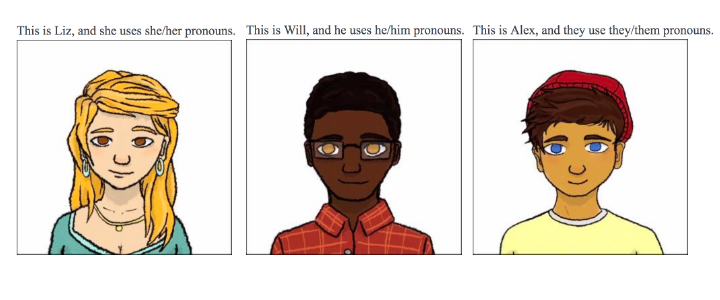Supporting Materials for Arnold, Mayo, & Dong (2021)
Arnold, J. E., Mayo, H., & Dong, L. (2021). My pronouns are they/them: Talking about pronouns promotes singular they. Psychonomic Bulletin and Review.
Materials on this page:
- Abstract
- Stimuli
- Demographic questions
- Author recognition task authors
- Questions used in the main pronoun comprehension task
- Supplemental Data
- Demographic data for participants in study.
- Comparison of experiments 2 and 3
- Technical report: Analysis of individual difference data
- OSF page with raw data
- Arnold, Mayo, & Dong CUNY conference talk presentation
- This spoken presentation reports on experiments 1 and 2 from the published paper, plus a third experiment that is not reported in the published paper. The published experiment 3 is a cleaner version of experiment 3 in the talk.
Abstract
The pronoun “they” can refer to an individual who identifies as nonbinary, but it also is commonly used as a plural pronoun. How do listeners identify whether “they” is being used in a singular or plural sense? We test the role of explicitly introducing gender identity via pronouns, e.g. “This is Alex, and they use they/them pronouns.” In three experiments, participants read short stories like “Alex went running with Liz and they fell down.” Answers to “Who fell down” indicate whether participants interpreted they as Alex or Alex-and-Liz. We find that they functions much like he and she, where the singular interpretation is stronger in discourse contexts that make Alex more available, that is when Alex is the only person in the context, or when Alex was mentioned first. Critically, the singular interpretation is stronger when participants heard explicit instructions that Alex uses they/them pronouns, even though participants in all conditions had ample opportunity to learn this fact through observation. Results show that the social trend to talk about pronouns has a direct impact on how language is understood.
Character images
Many thanks to Darith Klibanow for her artistic rendition of Liz, Will, and Alex.

This image is copyrighted to Jennifer Arnold 2020.
Stimuli
A. Demographic questions
- Consent form
- If they did not provide consent they were not able to continue the survey
- What is your age? (fill in the blank)
- If they answered age 17 or younger the survey ended and they were informed that they did not meet the criteria of the experiment
- What is your proficiency in English? (native / good / poor)
- If they answered good or poor the survey ended and they were informed that they did not meet the criteria of the experiment
- When did you learn English? (as a baby / before age 6 / during elementary school / during middle/ high school / in college or later)
- If they chose any answer besides “baby” or “before age 6”, the survey ended and they were informed that they did not meet the criteria of the experiment
- Have you ever been diagnosed with a language disorder? (Yes/no)
- If they chose “yes”, they were asked to describe.
- Sex (male/female)
- What is your gender identity? (free-response)
- Is there anything else you’d to say about your gender? If not, leave blank. (free response)
- Ethnicity (Hispanic or Latinx / Not Hispanic or Latinx / Do not wish to report)
- Race (American Indian / Alaska Native; Asian; Native Hawaiian or other Pacific Islander; Black or African American; White; More than one race; Unknown; Do not wish to report)
- What is the highest level of education you have finished? (Did not graduate high school; Graduated high school or GED; Some college, 2-year college or technical school; 4-year college degree; Masters, professional, M.D., Ph.D.or other graduate degree)
- How many people do you know personally who have a gender identity other than male or female (yourself included)? (None; 1; 2-5; 6 or more)
- How familiar are you with people who do not identify as either male or female? (0-10 sliding scale)
B. Author Recognition Task used in Exp. 2
This revised version of the ART was created by Peter Gordon, with the purpose of including a greater proportion of author names that are familiar to our population (UNC students). Note that our version differs from the Gordon lab version in that uses the spelling “Kormer” instead of “Kromer” for one nonauthor.
Lauren Adamson, Isabel Allende, Eric Amsel, Carter Anvari, Isaac Asimov, Margaret Atwood, Jane Austen, Margarita Azmitia, Frank Bardin, Reuben Baron, Christopher Barr, Gary Beauchamp, Saul Bellow, Lauren Benjamin, Thomas Bever, Elliot Blass, Harrison Boldt, Hilda Borko, Ray Bradbury, Dan Brown, Jennifer Butterworth, Katherine Carpenter, Willa Cather, Raymond Chandler, Devon Chang, Tom Clancy, Mary Higgins Clark, , Suzanne Collins, Charles Condie, John Condry, Julia Connerty, Diane Cuneo, Clive Cussler, Denise Daniels, Geraldine Dawson, Nelson Demille, Sarah Dessen, Aimee Dorr, W. Patrick Dickson, Umberto Eco, T. S. Eliot, Nora Ephron, Habib Farah, William Faulkner, Frances Fincham, F. Scott Fitzgerald, Martin Ford, Howard Gardner, Ryan Gilbertson, Sue Grafton, John Green, Carla Grinton, John Grisham, Mimi Hall, Ernest Hemingway, Tony Hillerman, Khaled Hosseini, Robert Inness, Kazuo Ishiguro, Lilly Jack, Lena Johns, James Joyce, Kirby Kavanagh, Jonathan Kellerman, Frank Kiel, Stephen King, Susan Kormer, Judith Krantz, Wally Lamb, Reed Larson, Harper Lee, Pricilla Levy, C.S. Lewis, Lynn Liben, Jack London, Robert Ludlum, Alex Lumsden, Hugh Lytton, Bernard Malamud, Frank Manis, Gabriel Garcia Marquez, Jennifer Marshal, Sophia Martin, Anne McCaffrey, Morton Mendelson, Stephenie Meyer, James Michener, Margaret Mitchell, James Morgan, Ryan Morris, Vladimir Nabokov, Joyce Carol Oates, Michael Ondaatje, George Orwell, Samuel Paige, Scott Paris, Richard Passman, James Patterson, David Perry, Jodi Picoult, Thomas Pynchon, Ayn Rand, Peter Rigg, Rick Riordan, Veronica Roth, J. K. Rowling, Salman Rushdie, J. D. Salinger, Miriam Sexton, K. Warner Shaie, Robert Siegler, David Singer, Nicholas Sparks, Danielle Steel, Janice Taught, Tracy Tomes, J. R. R. Tolkien, Kurt Vonnegut, Nicole Waugh, E. B. White, Noah Whittington, Ava Wight, Virginia Woolf, Herman Wouk, Allister Younger, Steve Yussen
C. Stimuli for pronoun task
Experiments 1 and 2
| Order | Type | Stimuli | |
| 1 | Training | Liz walked home. She forgot to bring her keys. | |
| 2 | Training | Alex went to the store. They bought some milk. | |
| 3 | Training | Will needed to be at work by 9. He ran to the bus stop. | |
| 4 | Training | Alex saw a worm on the sidewalk. They tried to pick it up. | |
| 5 | Training | Liz watched the seagulls fly around. She scattered bread crumbs on the ground. | |
| 6 | Training | Will broke his computer. He needed to bring it in for repair. | |
| 7 | Training | Will bought a book from the bookstore. He read it on a bench. | |
| 8 | Training | Alex ordered lunch at the cafeteria. They forgot to say no pickles. | |
| 9 | Training | Liz ate a PBJ sandwich. She was tired of the same thing every day. | |
| 10 | Training | Will took a break in the afternoon. He was tired of dealing with people. | |
| 11 | Training | Liz canceled her dentist appointment. She wanted to eat cake instead. | |
| 12 | Training | Alex remembered to bring an umbrella. They didn’t get wet. | |
| 13 | Critical | one person | Alex went running. They fell down. |
| Alex first | Alex went running with Liz. They fell down. | ||
| Alex second | Liz went running with Alex. They fell down. | ||
| 14 | Filler | Liz saw a movie with Will. He didn’t enjoy it. | |
| 15 | Filler | Liz danced with Will. She tripped many times. | |
| 16 | Filler | Liz went kayaking with Will. They had a great time. | |
| 17 | Critical | one person | Alex swept the floors. They coughed a lot from the dust. |
| Alex first | Alex swept the floors with Liz. They coughed a lot from the dust. | ||
| Alex second | Liz swept the floors with Alex. They coughed a lot from the dust. | ||
| 18 | Filler | Will went shopping with Liz. She bought a suit. | |
| 19 | Filler | Will cleaned his apartment. He got his clothes dirty. | |
| 20 | Critical | one person | Alex had coffee at Starbucks. They made a mess. |
| Alex first | Alex had coffee with Will at Starbucks. They made a mess. | ||
| Alex second | Will had coffee with Alex at Starbucks. They made a mess. | ||
| 21 | Filler | Liz took a vacation. Sweden was lovely. | |
| 22 | Filler | Will tried to fix a car with Liz. He didn’t know how to use the screwdriver. | |
| 23 | Critical | one person | Alex ate a large dinner. They felt bloated for hours. |
| Alex first | Alex ate a large dinner with Will. They felt bloated for hours. | ||
| Alex second | Will ate a large dinner with Alex. They felt bloated for hours. | ||
| 24 | Filler | Will folded laundry. The fitted sheet had a tear in it. | |
| 25 | Filler | Liz ran to the supermarket with Will. She found some great deals. | |
| 26 | Critical | one person | Alex played Mario Kart all day. They had sore fingers at the end. |
| Alex first | Alex played Mario Kart all day with Liz. They had sore fingers at the end. | ||
| Alex second | Liz played Mario Kart all day with Alex. They had sore fingers at the end. | ||
| 27 | Filler | Liz closed a business deal. She made lots of money. | |
| 28 | Filler | Liz swam one mile. She was tired. | |
| 29 | Filler | Will ran a marathon with Liz. They took more than five hours to finish. | |
| 30 | Critical | one person | Alex made breakfast. They broke some plates. |
| Alex first | Alex made breakfast with Will. They broke some plates. | ||
| Alex second | Will made breakfast with Alex. They broke some plates. | ||
| 31 | Filler | Will exchanged contact information with Liz. She sent a text right away. | |
| 32 | Filler | Will studied a new language. Japanese was difficult. | |
| 33 | Critical | one person | Alex spent all day cleaning the living room. They napped afterwards. |
| Alex first | Alex spent all day cleaning the living room with Liz. They napped afterwards. | ||
| Alex second | Liz spent all day cleaning the living room with Alex. They napped afterwards. | ||
| 34 | Filler | Liz went to school with Will. They took a lot of tests that day. | |
| 35 | Critical | one person | Alex drank some expired milk. They needed to go to the hospital. |
| Alex first | Alex drank some expired milk with Will. They needed to go to the hospital. | ||
| Alex second | Will drank some expired milk with Alex. They needed to go to the hospital. |
Experiment 3.
| Order | Type | Stimuli |
| 1 | Training | Liz walked home. She forgot to bring her keys. |
| 2 | Training | Alex went to the store. They bought some milk. |
| 3 | Training | Will needed to be at work by 9. He ran to the bus stop. |
| 4 | Training | Alex saw a worm on the sidewalk. They tried to pick it up. |
| 5 | Training | Liz watched the seagulls fly around. She scattered bread crumbs on the ground. |
| 6 | Training | Will broke his computer. He needed to bring it in for repair. |
| 7 | Training | Alex remembered to bring an umbrella. They didn’t get wet. |
| 8 | Training | Alex ordered lunch at the cafeteria. They forgot to say no pickles. |
| 9 | Training | Alex tried a new type of cereal. They didn’t like the prize in the cereal box. |
| 10 | Training | Will bought a book from the bookstore. He read it on a bench. |
| 11 | Training | Alex went on a grocery run. They couldn’t find any toilet paper. |
| 12 | Training | Liz ate a PBJ sandwich. She was tired of the same thing every day. |
| 13 | Training | Alex could not find the grocery receipt. They assumed it was lost in the laundry. |
| 14 | Training | Will took a break in the afternoon. He was tired of dealing with people. |
| 15 | Training | Liz canceled her dentist appointment. She wanted to eat cake instead. |
| 16 | Training | Alex tried to iron a button-up shirt to save money. They burned a hole through the sleeve. |
| 17 | Critical | Liz went running with Alex/Alex went running with Liz.. They fell down. |
| 18 | Filler | Liz saw a movie with Will. He didn’t enjoy it. |
| 19 | Filler | Liz danced with Will. She tripped many times. |
| 20 | Filler | Liz went kayaking with Will. They had a great time. |
| 21 | Critical | Alex swept the floors with Liz/Liz swept the floors with Alex. They coughed a lot from the dust. |
| 22 | Filler | Will went shopping with Liz. She bought a suit. |
| 23 | Filler | Will cleaned his apartment. He got his clothes dirty. |
| 24 | Critical | Alex had coffee with Will at Starbucks/Will had coffee with Alex at Starbucks. They made a mess. |
| 25 | Filler | Liz took a vacation. Sweden was lovely. |
| 26 | Filler | Will tried to fix a car with Liz. He didn’t know how to use the screwdriver. |
| 27 | Critical | Will ate a large dinner with Alex/Alex ate a large dinner with Will. They felt bloated for hours. |
| 28 | Filler | Will folded laundry. The fitted sheet had a tear in it. |
| 29 | Filler | Liz ran to the supermarket with Will. She found some great deals. |
| 30 | Critical | Liz played Mario Kart all day with Alex./Alex played Mario Kart all day with Liz. They had sore fingers at the end. |
| 31 | Filler | Liz closed a business deal. She made lots of money. |
| 32 | Filler | Liz swam one mile. She was tired. |
| 33 | Filler | Will ran a marathon with Liz. They took more than five hours to finish. |
| 34 | Critical | Will made breakfast with Alex./Alex made breakfast with Will. They broke some plates. |
| 35 | Filler | Will exchanged contact information with Liz. She sent a text right away. |
| 36 | Filler | Will studied a new language. Japanese was difficult. |
| 37 | Critical | Alex spent all day cleaning the living room with Liz./Liz spent all day cleaning the living room with Alex. They napped afterwards. |
| 38 | Filler | Liz went to school with Will. They took a lot of tests that day. |
| 39 | Critical | Alex drank some expired milk with Will./Will drank some expired milk with Alex. They needed to go to the hospital. |
Supplemental Data
A. Demographic Data for all three experiments
| Exp. 1 | Exp. 2 | Exp. 3 | |
| Age: mean (range) | 36.3 (22-61) | 37 (23-63) | 36.4 (21-66) |
| Sex | F: 25, M: 27 | F: 26, M: 28 | F: 25, M: 19 |
| Ethnicity: Hispanic or Latinx | 6 | 3 | 3 |
| Ethnicity: Not Hispanic or Latinx | 44 | 50 | 38 |
| Ethnicity: Do not wish to report | 2 | 1 | 3 |
| Race: Asian | 4 | 4 | 1 |
| Race: Black or African American | 5 | 3 | 8 |
| White | 39 | 46 | 33 |
| More than one race | 2 | 1 | 1 |
| Do not wish to report | 2 | 0 | 1 |
| Education: High school or less | 5 | 7 | 4 |
| Education: Some college, 2 year degree, or technical school | 25 | 24 | 18 |
| Education: 4-year college degree | 44 | 41 | 34 |
| Education: Masters, professional, Ph.D., M.D., or other graduate degree | 26 | 30 | 26 |
B. Statistical data from a model comparing experiments 2 and 3. The critical items and fillers were identical in each experiment. The only difference was that experiment 3 had a total of 16 training items, including 8 about Alex, while experiment 2 had a total of 12 training items, including 4 about Alex. A comparison showed no significant effect of experiment, nor any interactions with it. See the paper for analysis details.
| Estimate (SE) | t | p | |
| Experiment 3 vs. 2 | -0.44 (0.52) | -0.85 | 0.400 |
| Explicit vs. Implicit introduction of pronouns | 1.97 (0.54) | 3.68 | <.001 |
| Discourse context (1 vs. 2 person) | 1.09 (0.36) | 2.99 | 0.013 |
| Explicitness x Discourse context | -1.07 (0.71) | -1.52 | 0.151 |
| Experiment x Explicit | 1.24 (1.09) | 0.90 | 0.261 |
| Experiment x Discourse Context | 0.56 (0.62) | .0.900 | 0.370 |
| Experiment x Explicit x Discourse Context | -0.66 (1.35) | -0.49 | 0.623 |
C. Technical Report — Link to technical report discussing individual difference data; in summary there are virtually no significant effects: Arnold, Mayo, & Dong (2020).


